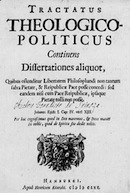
Source: Theologico-Political Treatise - Part I
Spinoza's preface– wherein he lays out his plan for the book
 Main points that he will elaborate on:
Main points that he will elaborate on:
In an uncertain world most men are superstious and prone to credulity.
Religion is used by a despotic state to keep power, a free state demands freedom of expression.
Freedom of speech and thought are necessary for a civil society.
The Bible is to be studied rationally not taken literally.
The Law of Moses is specific to the Jewish people and they are not especially chosen.
The Bible is not philosophy and is not to be taken literally.
Freedom of religious choice is necessary for pubic order.
Men have natural rights which cannot be taken from the without danger to the state.
To trace how religion acquired the force of law he will discuss the Hebrew state.
Leaders of the state can best retain their power and secure safety to their state "by allowing every man to think what he likes, and say what he thinks."
Spinoza's conclusion to the preface: Such, Philosophical Reader, are the questions I submit to your notice, counting on your approval, for the subject matter of the whole book is important and profitable. I would say more, but I do not want my preface to extend to a volume, especially as I know that its leading propositions are to Philosophers but common places. To the rest of mankind I care not to commend my treatise, for I cannot expect that it contains anything to please them: I know how deeply rooted are the prejudices embraced under the name of religion...Therefore the multitude I ask not to read my book; nay, I would rather that they should utterly neglect it, than that they should misinterpret it after their wont. They would gain no good themselves, and might prove a stumbling-block to others,whom I seek in this work especially to benefit.